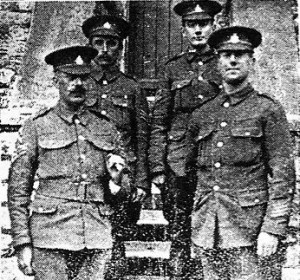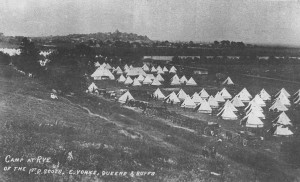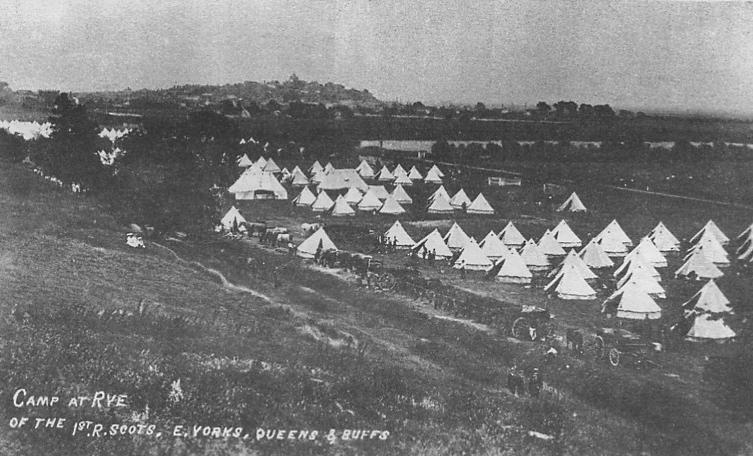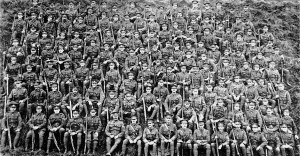It is difficult to recapture the atmosphere of the terrible 1914—18 war years. Ninety-Seven years is a long period in time, and memories fade and soften.
The men of Rye went to war mainly with Rye “E” Company of the Royal Sussex Regiment, doing home duty, first at Dover Castle and then at the Tower of London, before joining the front in the muddy battlefields of France and Belgium.
Other local men were serving with some of Britain’s finest Regiments and saw action in the very early part of the war, in Rye itself there was considerable war activity. At first it was thought that a German invasion was possible or that acts of sabotage might be carried out by German sympathisers. A guard was mounted on all important bridges in the town, and despite very uncomfortable weather conditions, continued until the danger was adjudged to be past.
Stories of Rye lads in action soon began to trickle back from the front. Gunner A. Bourne was injured at the Battle of the Aisne on 16th October, 1914. For a time he was the only member of his gun crew not wounded and was able to load, lay and fire several shots before being blown away from the gun. He was the only one of his detachment to survive the battle.

Private H. L. Hook, of Traders Passage, served with the 2nd Royal Sussex Regiment and was one of the first Rye men to see action at the front. His regiment landed at Havre and after a short rest proceeded to Mons where they were very soon engaged in fierce action with the enemy. After a defensive engagement they found the Germans to be in retreat and, following after them, captured the bridges over the Aisne intact.
The following morning they advanced again and were greeted by a hail of bullets and shell fire. Private Hook was struck by a bullet. It passed through a tin of meat in his haversack under his right shoulder, and out through the right lung without injury to any bone. For about twelve hours he lay on the field with a dead comrade either side of him. An Artillery officer found him and advised him to lie there until help came. It rained for hours and he was cold and wet. He crawled towards a burning haystack where he discovered help in the form of an advanced post of the Northampton Regiment. They brought an ambulance wagon and placed him in it. He was returned home to Rye to convalesce.
German “aliens” resident in Rye were ordered out of Rye on October 22nd, 1914, a report in a local paper states. “The remaining four males who were recognised as German aliens were, by order from the authorities, sent away from the town under escort of the Police on Thursday morning, so that at last Rye has no known representative of Germany resident here. It is to be hoped that the other South Coast towns are carrying out the order as strictly as the Superintendent of Police in Rye has done, and that this dread of spies in their midst can have no longer any ground for imagination”. The paper did not report where the unfortunate people were sent to.
October also saw the discontinuance of the town guard over the bridges. Some councillors were worried at the Watch Committee’s decision to abandon the guard. Mr. R. P. Burra said:
“If there ever was a need to guard the bridges, especially the railway, it is at the present time”.
Alderman Gasson was of the same opinion. Councillor J. L. Deacon went further, he thought that waterworks and reservoirs also needed some security. In spite of these opinions the Town Guard was abandoned.
Several families of Belgian refugees evacuated from the Continent were billeted in Rye. Father Bonaventure, a well-known figure for many years in the affairs of the town, involved himself a great deal with their plight, meeting each new family as they arrived and personally seeing that their stay in the town was as comfortable as possible. Some came with only half their family, such was the panic and despair by the speedy German thrust into the Low Countries. Father Bonaventure made it clear that while he was much impressed by the generosity and kindness shown to the refugees by the people of Rye, he did not want them to be given intoxicants or money, excepting wages for any little thing they may do. He also pointed out that his committee would not countenance any work being undertaken by a refugee that would in any way injure an English person in their employment.
Recruiting in the area caused some controversy. The following is a letter that appeared in the local press at the time. “Sir, chancing to see in your columns a letter from someone who was at a recruiting meeting at Rye Harbour, and judging from a phrase which he quotes, that it was to my speech he refers, I must ask your courtesy to permit me to make some reply in your paper.

“Your correspondent states that the men were accused of being fools, skunks, cowards and traitors’ if they had not enlisted. I used the words skunks and cowards’, but wish to deny absolutely and completely that I employed them as he says. What I did say was if the men of England do not wake up and do their duty at this time, then afterwards the world will point at them and say cowards and skunks.’ We who have been recruiting these past weeks know well that it is useless to try and bully men into enlisting, nor do we attempt to do it. I do not wish it to be thought that in this letter I am trying to excuse myself for what I said. My words were as I have quoted them, and I need no excuse; but for the sake of the cause in which we are working I cannot allow such an erroneous report to be spread about by one who is under a misapprehension of what I said. P. E. Barnard.’
These notes cover just a few aspects of the Great War in its early period. There are many stories to be told of Rye and its people during the following desperate years, of the men who went and never returned, of the men who passed through Rye on their way to the trenches. Of the excellent work done by the Red Cross who turned the Monastery into a Hospital and of the efforts made by the women folk of the period.
Nearly 100 years have passed since that fateful day in August 1914 when we went to War with the Kaisers Germany. All of those who fought in those hideous and bloody battles have now passed on. The events of those terrible days should never be forgotten, for no war has ever demonstrated the destruction and fruitlessness of warfare more than this one. As Churchill said “We must learn the lessons of history”
If any of our readers have stories or pictures concerning Rye or Ryers during the 1914-18 period, we should be pleased to see them and perhaps use them in a future article concerning Rye in the Great War we are planning for the August 2014 issue of this magazine.

